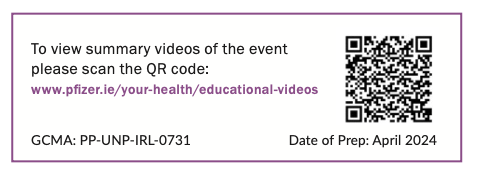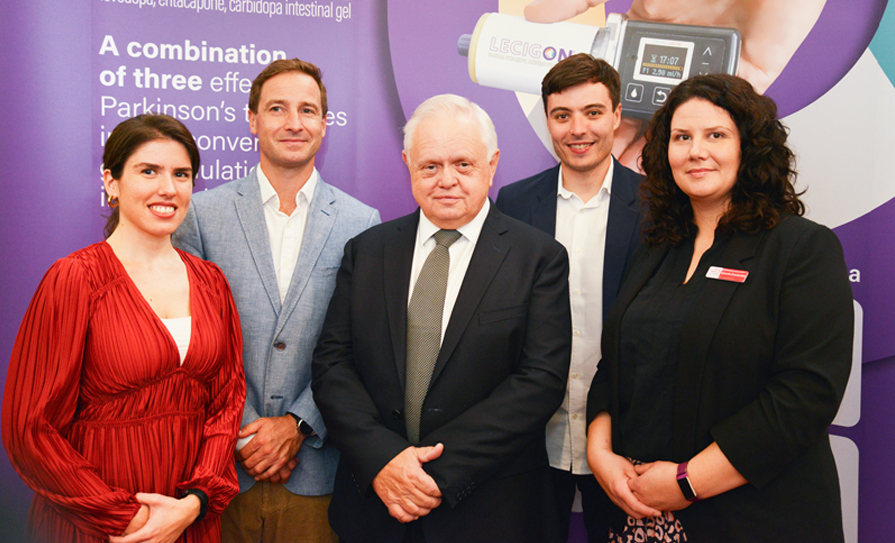The pressing and escalating issue of antimicrobial resistance was the subject of a recent multidisciplinary webinar
The dramatic impact of antibiotics on modern medicine, since the discovery of penicillin almost a century ago, cannot be understated. In a world without effective antibiotics, life expectancy would be significantly reduced as common surgeries would become too risky to perform and everyday infections would have the potential to kill. Yet a decline in antibiotic discovery coupled with the innate ability of pathogens to mutate and evade antimicrobial medicines means this could become a reality.
Global concern
Thus, the growing and increasingly urgent problem of antimicrobial resistance (AMR) was the subject of a multidisciplinary webinar entitled ‘Resisting Resistance: A Discussion on Innovation in AMR’ which was organised by Medical Affairs, Pfizer Healthcare Ireland, in collaboration with the RCSI and AMR Ireland, as experts in multiple fields discussed possible solutions to what they say is a major public health concern. According to the World Health Organisation (WHO), AMR contributes to almost five million human deaths from bacterial infections alone each year.
The meeting was opened by Prof Deborah McNamara, Vice-President of the RCSI and Consultant General and Colorectal Surgeon at Beaumont Hospital, Dublin, who informed attendees that AMR is one of the greatest threats to global health today and one that urgently needs to be addressed.
“It’s inconceivable that we could return to a world with a lack of access to safe and effective antimicrobials, where people die from simple conditions like appendicitis or where they experience lifelong cardiac problems like rheumatic fever from something as simple as a sore throat,” she said.
The webinar took place during the WHO Antimicrobial Resistance Awareness Week, and the Professor highlighted it was a timely opportunity to discuss advances in the combined fight against AMR. “We must use this focus on the problem to be innovative and take immediate and effective action in the fight against AMR.”
Dr Deirdre Fitzgerald-Hughes, Senior Lecturer and Deputy Head of the School of Postgraduate Studies at the RCSI, echoed Prof McNamara by calling AMR “one of the largest public health and societal challenges we face”. “Apart from the staggering statistics, it is difficult on a human level to imagine a world without antibiotics,” she said.
“Without good antibiotics, people will die from sepsis, meningitis, and pneumonia or it will become too risky to perform the surgeries that we take for granted now.”
According to Dr Fitzgerald-Hughes, it is “scary” how the problem has escalated in recent years. “Since the year 2000 we have seen AMR happen more quickly and more frequently. We need to find new drugs to treat resistant bugs and find ways of keeping these antimicrobials working too.” Her research group is on the case and seeking to develop new agents targeted against the priority pathogens of the WHO such as Staphylococcus aureus, Enterococcus faecium, and Klebsiella pneumoniae.
Research
Her work focuses on new ways to treat wound infections, particularly in patients with diabetes where the infections can be serious and long-lasting. Bone can also become infected requiring long courses of intravenous (IV) antibiotics, while topical treatments are not as effective, she noted. Management of these types of wound infection is especially challenging, with about 1-in-10 involving “superbugs” such as methicillin-resistant Staphylococcus aureus (MRSA).
Dr Fitzgerald-Hughes and colleagues are working on light-activated antimicrobials that could safely and effectively kill bacteria with minimal cytotoxicity, an approach that has been used with notable success in oncology, but is new in AMR. They have produced photosensitisers, or molecules that become excited when they absorb light, then produce reactive chemicals that kill the microbe in question.
This photodynamic antimicrobial inactivation has achieved 5- and 6-log reductions in microbial activity, with virtually all bacteria being destroyed. It is also highly effective at penetrating the sticky biofilms formed by bacteria which may conceal reservoirs of infection. “This is achieving very high killing, not only does it kill bacteria, but is able to break down those biofilms and gain access to the bugs hiding within those,” explained Dr Fitzgerald-Hughes. The hope is that ultimately these photosensitisers will be incorporated into solutions or wound dressings so that light can be delivered multiple times to activate the antimicrobial effect while also promoting wound healing.
Innovation
There is significant scope for innovation in this space, explained Dr Tanya Mulcahy, Director of the Health Innovation Hub (HIH). The HIH wants to help medics and scientists bring ideas and solutions around AMR to life, she told attendees, where they can have an impact on patients and the broader healthcare system.
While antibiotic resistance is a natural phenomenon, it can be caused by the overuse and misuse of available antibiotics, Mulcahy explained. She highlighted recent Irish innovations in the hygiene/disinfection space, such as robots using ultraviolet (UV) light to kill organisms, advanced air filtration systems, and methods of electrostatic cleaning. Enhanced technology will also help in terms of detection and diagnosis, meaning the focus will shift, she said, to earlier detection and point-of-care diagnostics. Sophisticated rapid detection tests will be able to identify the presence – or absence – of bacteria. “This means we will be better informed in terms of the choices we make and less inclined to request an antibiotic.”
Mulcahy encouraged attendees from all institutions to get in touch with the HIH, which works with universities and start-up companies to bring ideas to fruition.
Patient advocate and founder of ‘The AMR Narrative’, Vanessa Carter, spoke about navigating AMR after suffering serious injuries in a road traffic accident. Having had facial reconstruction using prosthetics including an alloplastic implant by a maxillofacial surgeon, she developed a serious infection. Eventually her prosthesis was removed, as it had become “colonised” with infection, including MRSA and other resistant microbes. Her efforts to raise awareness of and advocate for AMR have led her to establish a charity, The AMR Narrative, and she stressed the importance of survivors telling their stories so that AMR is better understood.
A panel fireside chat was then chaired by Prof Fidelma Fitzpatrick, Head of Department, Clinical Microbiology, RCSI and Consultant Microbiologist at Beaumont Hospital, Dublin. Introducing the panel, she noted that AMR is a problem that involves multiple disciplines and will require a multifaceted approach.
Dublin-based GP Dr Edel Doorley is the GP Lead for HSE AMRIC – the Antimicrobial Resistance and Infection Prevention and Control Team. She acknowledged that it can be challenging in the general practice setting to manage patient expectations in relation to antibiotic prescribing. GPs cannot always easily differentiate between viral and bacterial infections, but bacterial infections tend to be more severe and will often not self-resolve.
“How we address this is we educate patients as well as doctors – we have to explain to patients that we feel it is viral, but to return if their symptoms have progressed.” GPs now have lists of “green” or preferred antibiotics and “red” antibiotics to avoid prescribing, which she said is helpful, while Dr Doorley also praised the fact that antibiotic stewardship is now a key part of undergraduate and postgraduate training.
Prevention and Vaccination
In terms of AMR prevention, Associate Professor Siobhán McClean of the School of Biomolecular and Biomedical Science in University College Dublin is working on vaccines for AMR. She explained that ESKAPE (Enterococcus faecium, Staphylococcus aureus, Klebsiella pneumoniae, Acinetobacter baumannii, Pseudomonas aeruginosa, and Enterobacter spp) pathogens tend to affect the very young and older people – these are particularly susceptible populations. With an effective vaccine for infection, those immunised would be protected, but even those not immunised may also be protected by herd immunity. This would in turn drive down antibiotic use and help prevent AMR, as seen in practice with the Haemophilus influenzae type b (Hib) vaccination. “Before the vaccine, 60% of Hib isolates would have been carbapenem resistant/carbapenemase positive, but since the vaccine has become available, not only has the disease level fallen, but also the level of carbapenemase positive isolates.” Prof McClean’s research is focused on identifying potential vaccine candidates against three of the main ESKAPE pathogens, with the most promising targeted at Klebsiella pneumoniae.
Ms Mary Eva Regan, Senior Antimicrobial Pharmacist in the Quality, Safety, and Service Improvement Divisions at Community Healthcare West, spoke of her team’s work to address the issue of high levels of antibiotic prescribing in HSE residential care facilities in the region. Having surveyed over 4,000 residents, they found that 1-in-8 were taking an antibiotic at any one time, the majority of which were for suspected urinary tract infections. They began their “Skip the Dip” campaign, which aimed to discourage staff from routinely using a dipstick to check someone’s urine if they are symptom-free.
“We know that in older people, particularly in residential care facilities, 50-to-75% of the population will have bacteria in their urine – that’s an expected finding.” Dosing antibiotics correctly is another challenge, and Ms Regan cautioned against underdosing, which could potentially also lead to AMR.
Raising awareness of AMR is at the crux of the issue, and Dr Fintan Kelleher, the founder of AMR Ireland and an organic and bioorganic/medicinal chemistry researcher, noted that AMR is an equally urgent issue in animal health and “One Health solutions” are needed. He also called for a “common language” when it comes to reducing the overall AMR burden, saying the avoidance of jargon and acronyms will help the public better understand the problem.
“Plain English and simple messages are a good start – that will help us reduce the overall AMR burden.”
Prof Fitzpatrick agreed: “If we want to influence policy, we have to stop talking gobbledygook… we need to make the issue more accessible and understandable.” They all agreed that this is a multi-stakeholder problem and other professions must be involved in solving it. Dr Kelleher said behavioural scientists, for example, should be involved, as patient expectation or demand for antibiotics must be addressed.
“We don’t get people going into hospital demanding a particular heart drug – we need to protect our antibiotics in the same way.”
One audience member asked about the challenge for primary care in terms of antibiotic stewardship when, they said, a proportion of people who are not given an antibiotic will end up hospitalised. Dr Doorley agreed it is difficult to always get the balance right.
“In the moment when that person is very unwell it’s hard for them to take on board information regarding viruses vs bacteria, but we want to practise good evidence-based medicine, so that might mean asking them to come back if their symptoms haven’t resolved and prescribing an antibiotic then.”
Ms Regan noted that the literature suggests that up to one-in-five people will experience a side-effect from an antibiotic. “There is a risk associated with the antibiotic, so we need to educate people on those risks too.”
Prof McClean cautioned that we are heading into a “perfect storm” as illnesses such as diabetes are on the rise and the impact of climate on bugs will also soon become apparent. “Policymakers need to establish a huge advertising campaign targeting all generations about this problem because it’s going to get a lot worse.”
Conclusion
In her closing remarks, Pfizer’s Country Medical Director Orlaith Gavan said that AMR is a global problem that transcends borders and can affect anyone of any age from any country. “It is one of the biggest threats to global public health today…. The urgency to act has never been more apparent. It is not just a medical problem, but a global emergency.” Innovation will be key in the fight against AMR, she said, and she praised the innovation taking place right here in Ireland. “We need to become advocates and stewards for responsible antibiotic use and this needs to extend to our communities, classrooms, and homes.”
Report funded by Pfizer Medical Affairs











Leave a Reply
You must be logged in to post a comment.